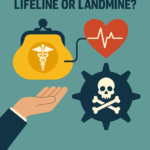
Ghana’s Parliament has passed a law that could dramatically reshape access to emergency healthcare for its citizens. The Ghana Medical Trust Fund Act, 2025, now enshrined in law, seeks to offer financial support to individuals facing catastrophic medical conditions, especially where costs are beyond the reach of ordinary citizens and beyond the cover of the National Health Insurance Scheme (NHIS).
On paper, this is a bold and compassionate step toward health equity. However, the implementation risks are significant and may threaten the very foundation of Ghana’s public health financing system.
A Bold Promise with Real-World Relevance
The Medical Trust Fund is designed to fill a painful and all-too-familiar gap in Ghana’s health system: the countless lives lost or destroyed each year not due to lack of treatment, but due to lack of money. The Fund aims to cover complex and urgent medical cases, including cancers, organ transplants, congenital disorders, and other high-cost conditions that the NHIS either cannot afford or is not mandated to handle.
The urgency of this intervention is not theoretical. In 2024, Ghana was rocked by a renal dialysis crisis that exposed deep cracks in the country’s health financing model. Suddenly, out-of-pocket dialysis fees shot up beyond the reach of many patients, leading to heartbreaking scenes of patients being turned away or missing sessions at dialysis units. Public outrage followed. The Government’s response? A one-off subsidy was announced to placate public anger and keep the service running temporarily. This wasn’t a fix but an attempt to paper over the cracks.
This is not a duplication of the NHIS, but a complementary system designed to manage catastrophic cases—diagnoses that, in the Ghanaian context, often result in a death sentence. Is it considered duplication if the NHIS excludes certain advanced treatments, overseas care, or dialysis for end-stage renal failure? This Fund addresses a different issue: what occurs when NHIS coverage ends but the need for care persists?
The law establishes a governance board drawn from the Ministry of Health, the Ghana Health Service, civil society, and other stakeholders. It also mandates annual audits and reports to Parliament, measures designed to bolster transparency and accountability.
The Controversial Clause: 20% of NHIS Funds
But the Act contains one provision that has sent shockwaves through the health policy community: 20% of NHIS revenue is to be permanently allocated to this new Fund. This is now the law. How this figure was arrived at is a conundrum and could be seen as arbitrary.
The justification? Still unexplainable. Where is the actuarial modelling? Where is the costing data? Can a figure that impacts two national systems be determined without public scrutiny or stakeholder involvement?
I have not seen any actuarial analysis, no financial modelling, no impact assessment, just a bold, fixed figure carved out of an already overstretched NHIS. This decision, while perhaps driven by urgency or political momentum, threatens to destabilise the core insurance scheme Ghana has spent two decades building.
The NHIS is far from perfect, but it remains Ghana’s primary vehicle for Universal Health Coverage (UHC). It already struggles with reimbursement delays, a limited benefits package, and increasing provider dissatisfaction. Carving out a fifth of its revenue without expanding the overall health budget is not just financially risky, it’s structurally dangerous.
Risks That Must Be Confronted Head-On
- Beyond the financial impact, the new law leaves several critical implementation questions unanswered:
Who qualifies for funding? The Act does not define clear eligibility criteria, leaving decisions to the discretion of the Fund’s Board. Without means testing and objective benchmarks, access may become arbitrary or politically manipulated. - How will this integrate with NHIS? The creation of a parallel funding structure raises fears of fragmentation. Will patients have to navigate multiple bureaucracies? Will providers be caught in a tug-of-war between two payment systems?
- Can it be insulated from elite capture? Ghana’s political history is rife with well-intentioned public funds that become tools of patronage. Without independent oversight and citizen participation, the Trust Fund could suffer the same fate.
- What about administrative costs? Running a new national fund means hiring staff, building systems, and creating oversight frameworks. In a constrained fiscal environment, that cost must be weighed carefully against its potential benefits.
The Case for Caution and Reform
The intent behind the Medical Trust Fund is not in question. What is at stake is whether the approach adopted will work in practice without damaging what already exists. Alternatives exist. Ghana could have:
-Phased in the NHIS contribution gradually, starting at 5% and scaling up based on performance.
– Introduced a health solidarity levy on high incomes or earmarked luxury import taxes.
– Channelled a share of petroleum revenues or special VAT allocations into the Fund.
Crucially, such options would have allowed for new financing without undermining NHIS stability.
A Delicate Balance
The Ghana Medical Trust Fund Act, 2025, is a paradox of policymaking: it is both compassionate and potentially destructive. It offers a real opportunity to improve health outcomes for the most vulnerable, but its financing model threatens to rob Peter to pay Paul.
The 2024 dialysis crisis should serve as a national wake-up call — not just a justification for the Fund, but evidence that Ghana’s health system requires a secure, ring-fenced stream of funding for catastrophic illnesses. Advocates have long pressed for a reliable solution. Instead, the response was a one-off injection of cash, effectively in the short term. Why wait for media outrage to prompt action? Why leave patients with conditions such as end-stage renal disease, certain cancers, and congenital heart defects at the mercy of public sympathy?
The challenge now lies not in debating whether the law should exist, it is already in the books, but in ensuring its implementation is smart, transparent, and does not harm the broader goal of universal health coverage.
With the right implementation, particularly around eligibility criteria, financial sustainability, citizen oversight, and operational coordination with NHIS, the Fund could indeed become a lifeline. But if allowed to drift without these corrections, it risks becoming a bureaucratic landmine buried in Ghana’s health system.
Ghana must now walk this tightrope with discipline, foresight, and a firm commitment to equity.
- President Commissions 36.5 Million Dollars Hospital In The Tain District
- You Will Not Go Free For Killing An Hard Working MP – Akufo-Addo To MP’s Killer
- I Will Lead You To Victory – Ato Forson Assures NDC Supporters
Visit Our Social Media for More




